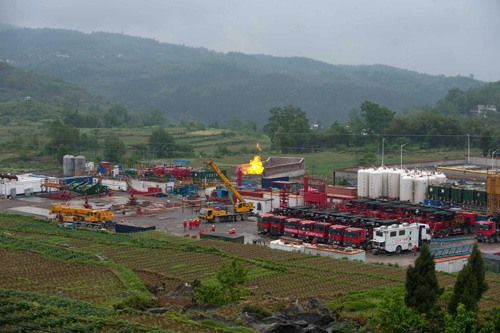|
 |
|
NEW ENERGY: Trial extraction of shale gas proceeds at the Fuling work zone by a branch company of Sinopec, China's largest oil refiner, in southwest China's Chongqing Municipality (LIU CHAN) |
Reserve Ratio Cut
China's central bank cut the reserve requirement ratio for county-level rural commercial banks and rural credit cooperative unions on April 25 to help increase the flow of credit.
The ratio for county-level rural commercial lenders was trimmed by 2 percentage points and that for rural credit cooperatives was cut by 0.5 percentage points.
The adjustment will help enhance financial support for rural development and guide credit flow to rural areas, the People's Bank of China said in an online statement.
However, the central bank did not say how much capital could be freed by cutting the ratio.
More Autonomy
China's State Council announced on April 24 that the country will reduce the government's power in terms of administrative approval for companies' investment projects.
Investment projects will only need to be registered instead of being approved if they can be effectively managed through economic measures and laws in sectors with sufficient competition and where companies have measures for self-regulation, a statement on the Central Government's website said.
Allowing companies' autonomy in investment is a necessity in balancing the roles of the government and the market, as well as an important move in utilizing the pivotal role of investment, boosting restructuring through reforms, and maintaining the stable growth of the economy, the statement said.
Private Capital
China announced 80 major public infrastructure projects on April 24, experimenting with wider access for private and overseas investors.
The decision was made at a State Council executive meeting, the second meeting in a month to focus on infrastructure investment.
The projects will cover railway and harbor construction, new infrastructure needed by the area of information technology, major clean energy projects such as hydropower, wind power and photovoltaic power, as well as modernization projects in oil and gas and chemical industries.
It has been expected that overseas investors are likely to benefit from the new infrastructure investment program along with domestic private-sector investors.
The State Council said private investment will be encouraged to enter fields that are "monopolistic in nature" or those that "used to be dominated by government investment and State-owned enterprises."
The State Council also decided that oil and gas exploration, public utilities, water resources projects and airport construction will be the next to open to private-sector investment.
Illegal Fund Raising
China will strengthen its efforts in cracking down on illegal fund-raising activities after an increase in such practices last year, a senior legal official said on April 22.
Public security departments prosecuted 3,700 illegal fund-raising cases in 2013, said Liu Zhangjun, Director General of the Office of the Inter-agency Anti-Illegal Fund-Raising Taskforce, at a press conference in Beijing.
The official said authorities had helped investors recover more than 6.4 billion yuan ($1.04 billion) of lenders' losses last year.
"Currently we are faced with severe challenges. The numbers of illegal fund-raising cases, total funds raised and those involved remain at high levels," said Liu.
Illegal fund-raising comes in different forms, such as by offering false wealth management products, valueless commemorative coins, stamps and currency notes, as well as the sale of sham stocks by self-proclaimed private banks to investors.
Meanwhile, online peer-to-peer (P2P) business has also become an area where illegal fund-raising occurs, along with the rising popularity of Internet finance in the country, Liu said. Authorities will enhance crackdown efforts against fraudulent advertisements while educating the public on risks.
| 